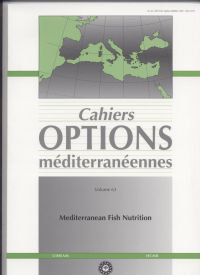| Article précédent | p. 91-102 | Article suivant |
Essential fatty acid requirements in Mediterranean fish species
Development of fish culture in the Mediterranean area has been partly based on the knowledge of the nutritional requirements of these species. However, formulation of specific diets for different marine fish species, restrictions in the availability of traditional ingredients and their substitution by alternative products, changes in feeding practices and introduction of fast growing strains require continuous updating of commercial cultured fish nutrition, including the determination of their essential fatty acid (EFA) requirements. Inadequate EFA contents in the diet give rise to several physiological, behavioural and morphological alterations, markedly reducing culture performance. EFA requirements change over the fish life cycle and, while juveniles may be able to survive for months on a diet very low in EFA, larvae may die in a few days and egg quality may be affected after only two weeks. Since environmental factors alter lipid composition of the fish tissue, EFA requirements could also be affected.
- [ Afficher ]
- [ Télécharger ]
- [ Exporter la citation ]
Vous pouvez télécharger la citation au format :
- [ Imprimer ]
-
Mots-clés
ACIDE GRAS ESSENTIEL, ALIMENTATION DES POISSONS, CYCLE DE DEVELOPPEMENT, REGION MEDITERRANEENNECiter cet article
Izquierdo M. Essential fatty acid requirements in Mediterranean fish species. In : Montero D. (ed.), Basurco B. (ed.), Nengas I. (ed.), Alexis M. (ed.), Izquierdo M. (ed.). Mediterranean fish nutrition. Zaragoza : CIHEAM, 2005. p. 91-102. (Cahiers Options Méditerranéennes; n. 63). Workshop on Mediterranean Fish Nutrition, 2002/06/01-02, Rhodes (Greece). http://om.ciheam.org/om/pdf/c63/05600069.pdf



